Is Turmeric Safe During Pregnancy?
In a hurry? Click here to read the Article Summary...
Most health experts agree that a varied diet is the best way for both mother and child to get the nutrition they need for a healthy pregnancy and childbirth.
At the same time, expecting mothers clearly need to be careful about consuming certain foods, such as liver (more on this later in the article), coffee, and alcohol as these may adversely affect the growing baby’s health and development.
But what about the South Asian root spice turmeric?
Given that along with curcumin, turmeric contains more than 300 potent compounds, is it safe for women to consume turmeric during pregnancy?
What is Turmeric?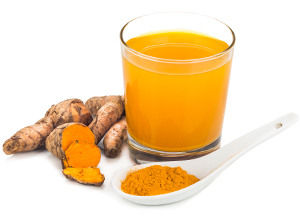
Typically added as a colorant and spice to Indian and South Asian curries, as well as to mustard and some cheeses, turmeric is the spice that gives these foods their distinctive yellow color.
Known scientifically as Curcuma longa, turmeric root has also been used in India as an important component in Ayurveda, the traditional Indian system of medicine which has been around for some 5,000 years or more.
More recently, thousands of scientific studies have been carried out on curcumin, the main ingredient in turmeric. Curcumin is now known to have anti-inflammatory and antioxidant properties and is believed to be responsible for many of turmeric’s known benefits.
So, what do we know so far about taking turmeric during pregnancy?
Low Levels of Turmeric During Pregnancy Are Considered Safe
The short answer is, it depends on how much turmeric is being consumed. In general, physicians typically advise expecting mothers against taking any supplements unless they are absolutely essential and recommended by a trained, certified physician.
One concern that has been raised is that consumption of turmeric may stimulate the uterus during pregnancy, possibly increasing the risk of premature births and miscarriages. However, laboratory experiments have shown that curcuminoids – which are a class of compounds found in turmeric that include curcumin – actually have a relaxing effect on uterine muscle.
While this is not conclusive evidence that it’s completely safe to consume turmeric during pregnancy, millions of women in India and other parts of south Asia do take small amounts of turmeric as part of their daily diet when they are pregnant, without any reported adverse effects.

Another concern is whether curcumin and other ingredients in turmeric can affect the growing baby’s development.
Scientific evidence shows that taking a high dose of a turmeric extract daily for up to 90 days did not cause any observable immediate or long-term toxic effects in laboratory animals. Also, turmeric had no mutagenic effects – in other words, no damage to DNA or other vital cellular structures was observed in laboratory experiments.
Based on the available evidence so far, it is perhaps safest for pregnant women to consume low quantities of turmeric – for instance as a spice to season foods such as curries and soups – but preferably not as a high-dose supplement. Women who are allergic to turmeric should completely avoid it during pregnancy.
Health Benefits of Turmeric During Pregnancy
The many health benefits of turmeric, some of which have long been exploited in Ayurveda, are also likely to benefit women during pregnancy, including:
- Safely managing inflammation within normal levels and relieving swelling and pain
- Boosting the immune system
- Maintaining levels of healthy bacteria in the gut, thereby maintaining stomach health and relieving constipation
- Increasing the flow of bile, which is necessary for breaking down dietary fats during digestion
- Detoxing the liver and purifying blood
- Helping to manage blood sugar and lipids within normal levels
Recently, curcumin has also been shown in laboratory experiments to prevent endometriosis, which is the abnormal growth of cells similar to those normally found inside the uterus (known as endometrial cells) in locations outside the uterus. This condition can have a profound social and psychological impact on women and potentially affect their chances of having children.
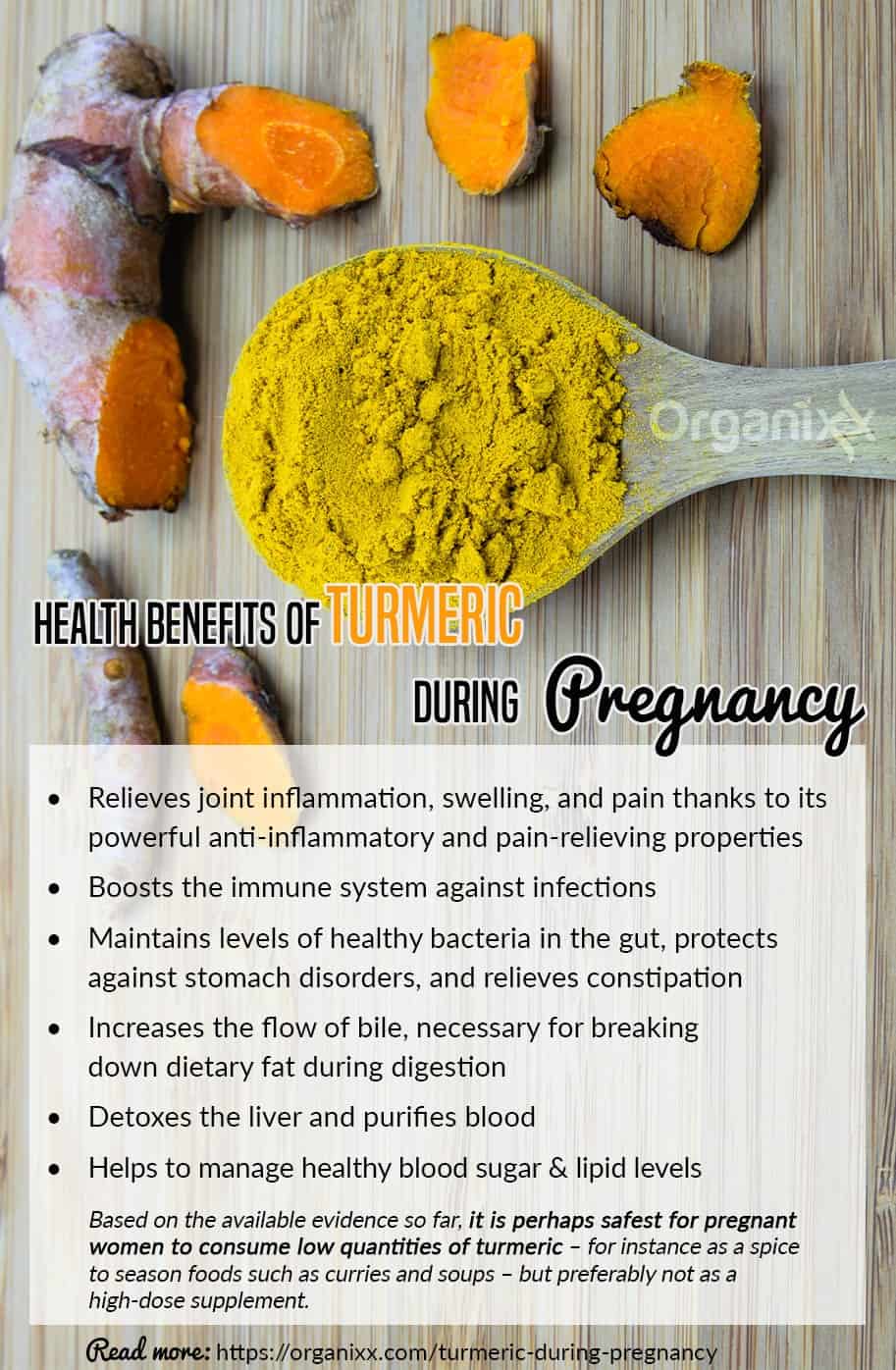
General Nutrition Tips During Pregnancy
Insufficient food intake has been linked to poor pregnancy outcomes. However, a greater awareness of the role of nutrition and improvements in prenatal food supplementation has had a significant impact on both general and nutritional health during pregnancy.
Please note that these nutritional tips are based on recommendations by various regulatory bodies such as the National Research Council (NRC). It is advisable to consult with a certified physician before adding any supplements to your daily diet during pregnancy.
- Protein – pregnant women are advised to consume 70 grams of protein daily. Adding a little protein to every meal can help to meet protein needs, keep energy levels stable throughout the day, and lower the risk of heartburn.
- Folate – is used to describe a number of water soluble B-vitamins, known collectively as vitamin B9. Folate helps to make and repair our DNA. It is also required for red blood cell production, to keep blood levels of homocysteine safely low, and support nervous system function.Folate also helps to prevent neural tube-related birth defects, including spina bifida − which is why women who are trying to conceive are advised to consume folate-rich foods and take supplemental folate or methylated folate as applicable every day until they are 12 weeks pregnant.Plant foods rich in folate include romaine lettuce, spinach, asparagus, turnip greens, mustard greens, parsley, collard greens, broccoli, cauliflower, beets, and lentils.Synthetic folic acid has been used for many years to fortify foods in the U.S. to reduce the chance of neural tube defects in developing babies. However, several concerns have recently been raised regarding its safety and effectiveness.
According to some reports, supplementation with synthetic folic acid is ineffective and perhaps even harmful in a significant proportion of people. Please consult your healthcare provider for information regarding the folate supplement most suitable for your situation. - Vitamin D – pregnant women are also advised to consider taking a vitamin D supplement, since this vitamin regulates calcium and phosphate levels, which are necessary to keep bones, teeth, and muscles healthy.All adults, including pregnant and breastfeeding women, need at least 10 micrograms (10 mcg) of vitamin D daily. (Read more about Vitamin D deficiency here.)
- Calcium – recommended daily reference intake (DRI) during pregnancy is 1000 mg, or 1 gram.
- Iron – recommended DRI during pregnancy is 27 mg. The National Academy of Sciences recommends a supplement with 30 mg/day after 12th week for most women.
- Vitamin A – pregnant women are strongly advised to stay away from vitamin A supplements or any supplements that include vitamin A (retinol), as too much of it could harm the growing baby. Liver is very rich in vitamin A so it is a good idea to limit liver consumption or avoid it entirely during pregnancy.Beta-carotene, the form of vitamin A found in fruits and vegetables, can safely be consumed in unlimited amounts, as the body will only convert it to vitamin A as and when needed.
If you’re not pregnant (or are pre- or post-pregnancy), and are looking for an excellent way to receive the health benefits of both curcumin (turmeric) and Vitamin D, you might consider Turmeric 3D from Organixx.
Turmeric 3D from Organixx provides you one of the most “bioavailable” forms of turmeric due to its unique fermentation process. This means your body experiences the maximum benefits of the purest, most potent turmeric available!
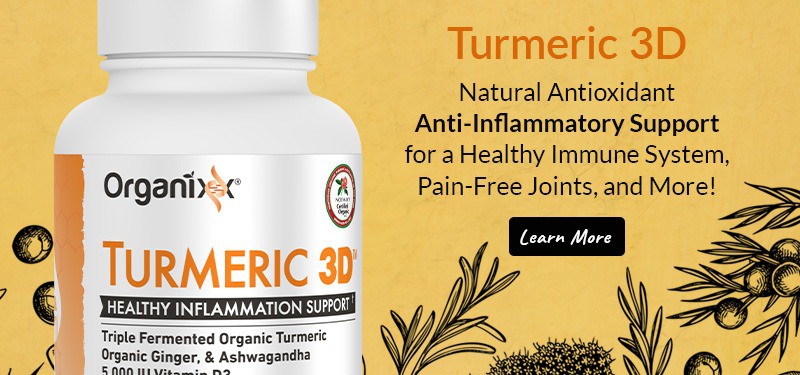
 Sources:
Sources:
Article Summary
Low levels of turmeric during pregnancy are considered safe.
Benefits of turmeric include:
- Managing inflammation and relieving swelling and pain
- Boosting the immune system
- Maintaining levels of healthy bacteria in the gut
- Increasing the flow of bile
- Detoxing the liver and purifying blood
- Managing blood sugar and lipids within normal levels
Good nutrition during pregnancy focuses on:
- Protein
- Folate
- Vitamin D
- Calcium
- Iron


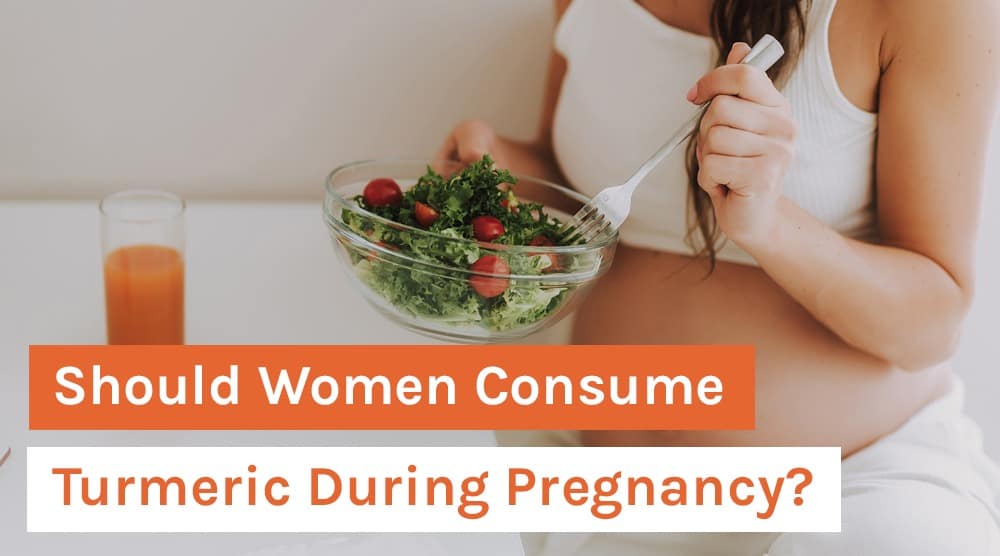
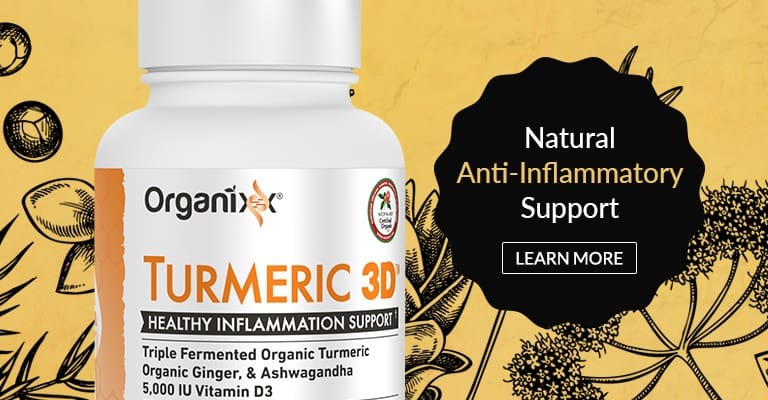


It is a common misconception that women should avoid liver during pregnancy. However, harm such as birth defects has been shown to occur due to SUPPLEMENTAL vitamin A before conception and during the first trimester. Vitamin A as part of a whole food does not affect the body the same way a synthetic supplement does (just as culinary amounts of real turmeric do not harm, but rather benefit pregnant women and their babies, but caution is advised with cue cumin supplements).
I would not advise to eat liver every day or in huge amounts (I don’t think that most women would even want to eat that much), but a couple ounces twice a week will not harm baby and can benefit mom with many nutrients to build blood volume and nourish her and baby.
Hi Teresa, thank you for sharing this information with us. Yes, we definitely agree that limiting liver consumption during pregnancy is a good thing to do. LOL I am with you on the fact that I doubt they would want to eat a lot of it anyway. Have an awesome day!!!
What is considered a low level of turmeric? For example, is 1/2 t of turmeric used in my daily golden tea ok in early pregnancy?
Hi Chris! First of all, congratulations on your bundle of joy!
For your question, we highly recommend to relay this concern to your OB-GYN to help you determine how much amount of turmeric would benefit you in your pregnancy.
We wish you the best!
In essence are you saying that tumeric is better than folic acid, please answer me
Hi Orison, thanks for your question.
We are sorry if this article has caused confusion on your end. This post does not recommend turmeric or curcumin supplements as a substitute for folic acid, escpecially for pregnant women. Additionally, this post does not state that taking turmeric is better than taking folic acid. We only wanted to list the health benefits of turmeric during pregnancy, as well as how low levels of turmeric during pregnancy are considered safe. It is advisable to consult with a certified physician before adding any supplements to your daily diet during pregnancy.
We hope this helped clarify things for you. Have a wonderful day ahead!
Am pregnant and I take turmeric as tea every morning is it a good thing and at the same time am positive of HIV please help me I really want to know
Hi Bethsheba. As mentioned in the article, small amounts of turmeric consumed as food during pregnancy is generally considered safe, however, anything beyond that, we suggest consulting with your trusted healthcare practitioner.
Thank you for this message.
You're welcome, Meentu. Thank you for taking the time to read this post.